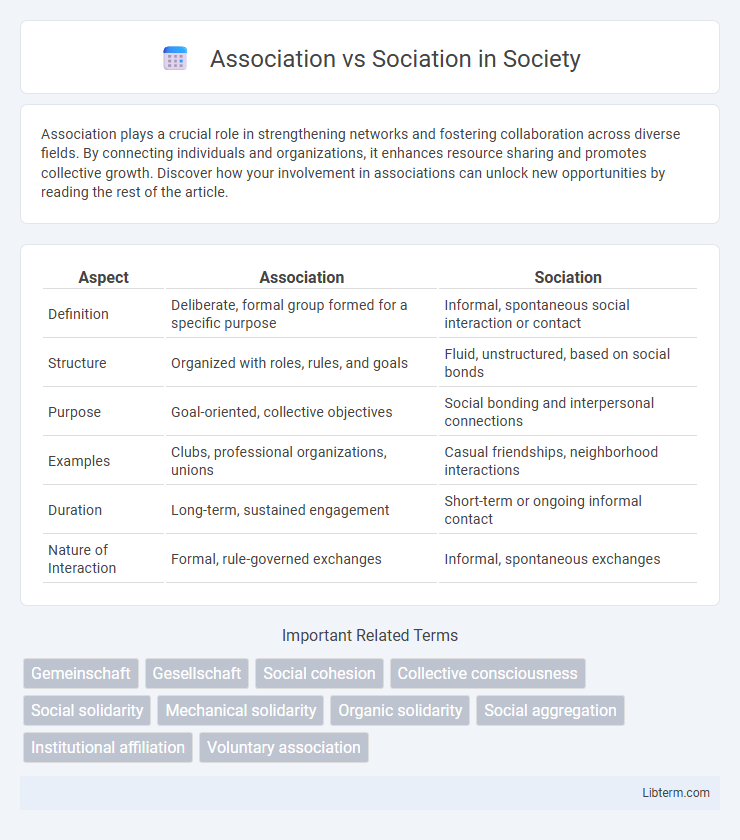Association plays a crucial role in strengthening networks and fostering collaboration across diverse fields. By connecting individuals and organizations, it enhances resource sharing and promotes collective growth. Discover how your involvement in associations can unlock new opportunities by reading the rest of the article.
Table of Comparison
| Aspect | Association | Sociation |
|---|---|---|
| Definition | Deliberate, formal group formed for a specific purpose | Informal, spontaneous social interaction or contact |
| Structure | Organized with roles, rules, and goals | Fluid, unstructured, based on social bonds |
| Purpose | Goal-oriented, collective objectives | Social bonding and interpersonal connections |
| Examples | Clubs, professional organizations, unions | Casual friendships, neighborhood interactions |
| Duration | Long-term, sustained engagement | Short-term or ongoing informal contact |
| Nature of Interaction | Formal, rule-governed exchanges | Informal, spontaneous exchanges |
Understanding Association and Sociation
Understanding association involves recognizing the connections formed between individuals based on voluntary agreements or shared interests, often resulting in structured groups or organizations. Sociation refers to the patterns of social interaction and relationships that emerge naturally within a community, emphasizing ongoing social processes rather than formal structures. These concepts highlight the difference between intentional group formation and the organic development of social bonds.
Defining Association: Meaning and Scope
Association refers to a structured relationship between individuals or groups formed based on common interests, goals, or activities, encompassing formal and informal organizations. It involves intentional and organized interactions, often codified through rules or agreements to achieve collective objectives. The scope of association extends across various domains, including social, professional, and economic contexts, highlighting purposeful collaboration rather than mere coexistence.
What is Sociation? A Conceptual Overview
Sociation refers to the dynamic process by which individuals form social connections and interact meaningfully within a group, emphasizing the qualitative aspects of social relationships. This concept highlights the importance of shared norms, values, and emotional bonds that create a sense of community beyond mere structural associations. Unlike association, which focuses on formal and often temporary connections, sociation underscores enduring, meaningful social ties essential for cohesive social groups.
Key Differences Between Association and Sociation
Association refers to a relationship characterized by formal, goal-oriented connections between individuals or groups, often involving structured and organized interactions. Sociation emphasizes social interactions that create collective identity and shared norms, focusing on the process of bonding and integration within a community. The key difference lies in association's focus on purposeful, often contractual ties, whereas sociation centers on the development of social cohesion and group solidarity.
Historical Perspectives on Social Groupings
Historical perspectives on social groupings distinguish association as a formal, goal-oriented organization often seen in modern societies, while sociation refers to informal, organic social bonds rooted in traditional communities. Early sociologists like Ferdinand Tonnies emphasized this dichotomy, defining association (Gesellschaft) as impersonal and contractual, contrasting it with sociation (Gemeinschaft), characterized by intimate, communal relationships. These concepts remain foundational in understanding the evolution from close-knit kinship groups to complex, structured societies.
The Role of Association in Social Development
Association plays a crucial role in social development by fostering cooperation and shared goals among individuals, which leads to the formation of structured communities and institutions. It enables the creation of formal organizations that promote collective decision-making, social norms, and economic progress. Unlike sociation, which emphasizes general social interaction, association specifically drives the development of organized groups essential for social stability and growth.
Forms and Functions of Sociation
Sociation refers to the various patterns of social relationships that structure human interactions, including primary and secondary forms such as intimate face-to-face groups and formal institutions. Its functions involve creating social cohesion, establishing roles and norms, and facilitating communication and cooperation within a society. Unlike association, which is typically voluntary and goal-driven, sociation encompasses both voluntary and involuntary connections that sustain social order and identity.
Examples of Association and Sociation in Society
Association appears in society through formal groups like clubs, corporations, or political parties where individuals join based on shared goals or interests. Sociation refers to informal, spontaneous social interactions and relationships such as friendships, family ties, or neighborhood interactions. Examples include a business partnership for association and casual conversations or cultural rituals illustrating sociation.
Sociological Theories Related to Association vs Sociation
Sociological theories distinguish association as a formal, goal-oriented relationship characterized by structured roles, whereas sociation refers to the informal, dynamic process of social interaction and group formation. Max Weber emphasized association in bureaucratic organizations where rational-legal authority prevails, while Georg Simmel highlighted sociation as the fluid, ongoing patterns of social life shaping individual identities. Contemporary theories integrate these concepts to analyze how institutional frameworks influence social bonds and collective behavior, balancing structured associations with emergent sociation processes.
Implications for Community and Social Dynamics
Association involves formal, goal-oriented connections such as organizations or clubs, emphasizing structured interaction and shared objectives within communities. Sociation refers to informal social interactions and relationships that form the fabric of community life, influencing social norms and collective identity. These dynamics affect social cohesion, with association fostering organized cooperation and sociation nurturing emotional bonds and cultural continuity.
Association Infographic

 libterm.com
libterm.com